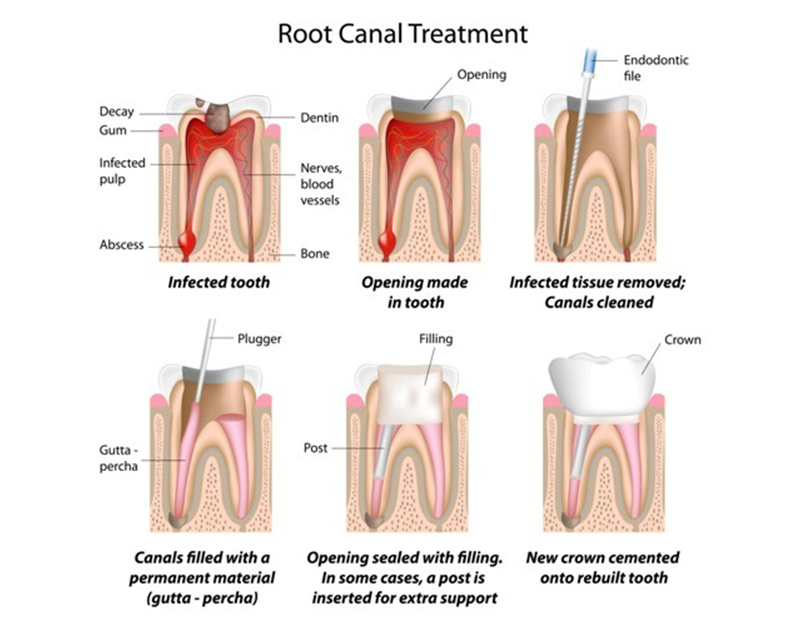First, let us discuss the common misunderstanding about endodontic treatment. Root canals are commonly thought of as the “worst” dental service you could need or as extremely painful, when in fact they can be as comfortable as getting a filling placed. Root canals get their bad rap from stories of those who have ignored a serious problem and are done early before the infection is too severe, typically making them very comfortable. If you are currently experiencing dental pain, which you feel is being caused by an infected or abscessed tooth, you need to contact our office immediately for a diagnosis. Tooth pain does not typically go away on its own. It may subside, but if nothing is done to handle the source of that pain, it will come back and usually worse. Dr. Robert Seaman provides 24-hour emergency care, so if we are currently closed and you are in pain, please contact him at 816-223-8119.
Why Are Root Canals Needed?
A root canal is the only way to save an infected or dying tooth.
Here are some reasons why the nerve of a tooth can become infected:
- Decay gets very close to or reaches the nerve of the tooth
- A hard blow to a tooth causes the nerve to react negatively
- Multiple services performed on the same tooth can cause a nerve to become hyper-sensitive and start dying
- A crack in a tooth extends to the nerve chamber
- Severe gum disease allows bacteria to reach the tip of the root and infect the tooth
What Is a Root Canal?
A root canal is the removal of infected nerve tissues inside a tooth and the filling of the nerve chamber. Below is an illustration of this process and further explanation.

As shown in the picture above, here is how a root canal is performed: after the tooth is numbed, the doctor creates an access hole in the tooth to reach the nerve chamber, where the infected nerve tissue is removed with small instruments called “files”. After this, a rubbery material is used to fill the empty canal, and the procedure is done. This procedure can often be done in one visit; though when the infection is more progressed, an additional step of medicating the infected nerve tissue may be needed, requiring two or three appointments before the nerve chamber is ready to be filled.
Before root canals were common practice, teeth in the above conditions were often removed as the only means of stopping the pain and removing the source of infection. Now, many more teeth can be saved, helping patients keep their natural teeth for a lifetime. Root canals are still not 100% effective, and in some cases, still result in eventual tooth loss after multiple attempts at endodontic treatment. But this is a small percentage of cases.
Watch the following video which explains how a tooth becomes infected when decay reaches the nerve and how a root canal is performed.
What Happens After I Have a Root Canal?
Once the root canal is completed, the next step is to have a crown done on the tooth. A crown is needed because the nerve of the tooth has been removed and this was the only means of blood supply to the tooth. Without blood supply, the tooth will basically dry out, become brittle and be very likely to break. To protect the tooth from this, a crown is placed to hold the tooth together. In our office, if the tooth receiving a root canal does not already have a crown on it, we will typically perform both procedures simultaneously. This saves on the total number of visits and provides a temporary crown on the tooth immediately to help protect it during and immediately following the root canal procedure.
Are There Other Treatment Options, Instead of Having a Root Canal Done?
You always have the option of having the tooth extracted, but to do so and not replace the tooth will lead to other dental problems. Saving a tooth via a root canal is still a much less expensive option than having to remove and replace the tooth with fixed bridgework or implants.
If you believe you need a root canal or have already been diagnosed as needing a root canal, we are here to answer your questions or concerns, so please give us a call 913-631-2626 or email us. You can have your root canal procedure done by our dentist at Seaman Family Dentistry in Lenexa, Kansas, just call us to schedule your appointment.


 913-631-2626
913-631-2626